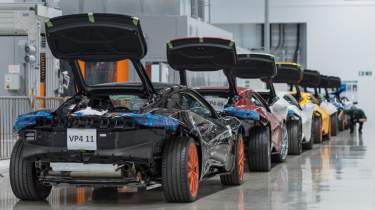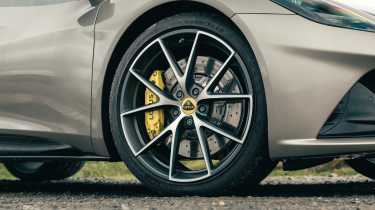Lotus cuts 550 jobs to save Hethel
Lotus has announced additional redundancies at its Hethel factory as sales drop 43% in the first half of 2025

Lotus has confirmed it is to make 550 staff redundant at its Hethel factory in Norfolk, with a source close to the matter suggesting this could rise to 700. This latest round of cuts will reduce the current workforce to 750 at the home of the British sports car brand founded by Colin Chapman. In a statement, Lotus said: “Following a review of Lotus Cars business objectives in line with the current market conditions, the company has announced a restructuring proposal, which anticipates a reduction of up to 550 roles across the business in the UK.”
The news was broken to staff in a company-wide meeting on Thursday 28 August and follows recent reports that Lotus Europe CEO Matt Windle has left his role just four months in the position. However, in an email to evo Lotus claimed that Windle had not left the business and was taking a leave of absence for personal reasons, although this contradicts credible evo sources who have confirmed the former Lotus apprentice has left the business. Supporting the business day to day is Mao Jingbo, Chief Strategy Office of Lotus Technology, and Matt Nice, Executive Director of Corporate Office at Group Lotus.
This latest round of job cuts - 200 staff were also let go in November 2024 - come after the story broke last month that Geely was looking at potentially closing its Hethel factory, where the Evija and Emira are both produced. Lotus denies it ever had any plans to close its UK manufacturing plant and that it remains part of its ongoing strategy. However, sources close to the matter who have reached out to evo claim that it has taken months of work behind the scenes to protect both the workforce while securing the plant's immediate future.
Lotus went on to say: “The proposal is designed to enable Lotus Cars to operate with a flexible and agile business model, allowing it to ramp up operations and resources in line with demand, as and when needed.” Lotus went on to say this approach is necessary “in order to secure a sustainable future for the company.”

Ownership of Lotus changed in 2017 when Geely took a 51 per cent stake in the company, with Etika Automotive (part owned by Proton and Syed Mokhtar AlBukhary, whose DRB-HICOM company owns Proton) retaining a 49 per cent stake.
On 1st July 2025 Etika exercised its put option requiring Lotus Technology, the NASDAQ listed company created to build the Eletre and Emeya electric vehicles, to acquire Etika’s stake in Lotus Cars. Lotus Technology’s largest shareholder, with a 50.6 per cent stake, is the AlBukhary Corporation and its largest shareholder is Syed Mokhtar AlBurkhay. Geely Holding Group owns a 23.1 per cent stake with Lotus Technology’s CEO Qingfong Feng also Vice President of Geely Holding Group.
Initially Geely invested in Lotus and Hethel, with the development of the Emira, and the Evijia electric hypercar the fruits of this. At the same time Lotus Technology developed and launched the Eletre and Emeya SUV and GT that are currently manufactured in Wuhan, China.
Delays to the Emira’s production and delivery hit its sales potential, and with no market for electric hypercars Hethel had barely got its breath when the wind was knocked from it. Combined with the Eletre and Emeya offering nothing above and beyond their rivals in the a highly competitive and cutthroat sector, Lotus has struggled to deliver on its opportunities and promise.

First half year sales for 2025 are down 43 percent, with sales of the electric models down a fifth to 1,922 units and sales of the sports car down an unsustainable 64 percent to just 891 units delivered in 2025 (and only 240 in quarter two). America’s introduction of tariffs accounts for some of this drop in sales, but sales in Europe haven’t been strong enough to plug the holes, with 601 fewer cars delivered during the first half of 2025 compared to the same period in 2024. Deliveries to North America have plunged to 430 from 1,278, with the rest of the world is down from 928 to 122 units. Only China has seen an increase, from 1,239 to 1,403 deliveries.
Not that these figures have prevented Lotus Technology from presenting a future product road map. This includes a facelift for the Emira in 2027 (when production was due to end as both the Toyota V6 and Mercedes-AMG four-cylinder fall foul of EU7 emission regulations) with potential for a new plug-in hybrid engine. There are also plans for a new Hyper Hybrid EV for 2026 that will be shown later in 2025 (this is thought to be an evolution of the current Eletre and Emeya family), and a Vision X, Hyper Hybrid EV for 2027.
Operating in markets that either face tough global competition (electric vehicles) or contracting market share (low-volume sports cars), Lotus Technology needs to find an immediate viable solution for Lotus’s future. One such avenue could be for Lotus Engineering to take on a more prominent role at Hethel, as hinted at in the official statement: “the company plans to increase integration globally across the wider Lotus Group and is exploring greater sharing and collaboration across its operations.”

With Geely-owned Polestar making cutbacks at its MIRA engineering facility in the Midlands, it could make economic sense for the Chinese electric car brand to up sticks and relocate to Norfolk. Hethel could also be used as a production facility for Eletre and Emeya models that are currently imported from Wuhan, although this would require sizable investment to update the current facilities.
Production of the reengineered plug-in hybrid Emeya and Eletre models could also provide a much needed lifeline for the Norfolk factory, but would also require considerable investment and certainly more than the $300 million Lotus Technology raised in August via AWT Partners.
Outside of Geely’s own brands, Lotus Engineering has a proven track record working with third-party manufacturers from design to engineering and validation test programmes, which could be a further lifeline for the UK arm of Lotus Technology. Regardless of what decisions are made by Feng and his colleagues and shareholders, it appears the survival of Lotus sports car production at Hethel is looking less likely than ever.
This story was updated following the publication of Lotus Technology’s half year results on 29 August 2025.









